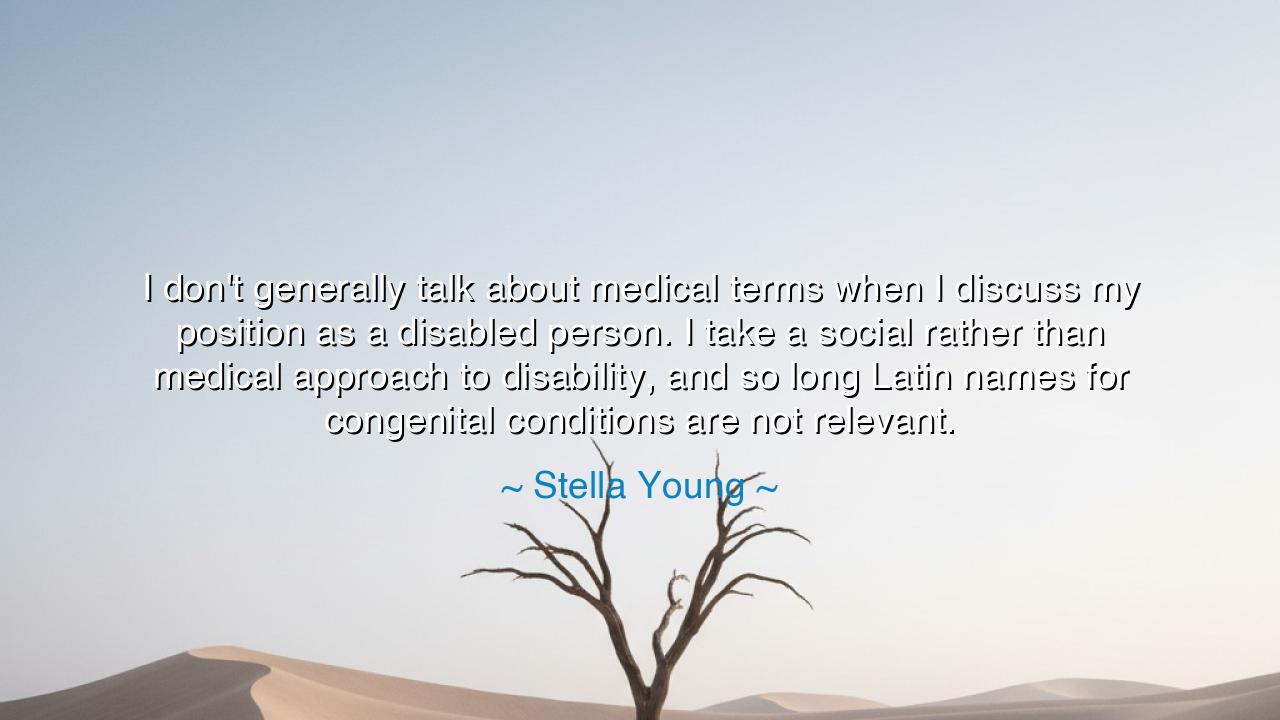
I don't generally talk about medical terms when I discuss my
I don't generally talk about medical terms when I discuss my position as a disabled person. I take a social rather than medical approach to disability, and so long Latin names for congenital conditions are not relevant.






Hear, O seekers of truth, the voice of Stella Young, who with clarity and courage declared: “I don't generally talk about medical terms when I discuss my position as a disabled person. I take a social rather than medical approach to disability, and so long Latin names for congenital conditions are not relevant.” In these words shines a light that pierces the ancient shadows of misunderstanding. She lifts the burden from the body and places it upon society, proclaiming that disability is not a prison of flesh, but a mirror reflecting how the world chooses to honor or to hinder its own people.
The meaning of her words rests upon a great truth: that a person is not defined by the Latin names of their condition, nor by the cold syllables of medical terms, but by their humanity, their dignity, and their place in the community. The medical approach sees only impairment, deficiency, or diagnosis. But the social approach asks a greater question: why does society build barriers instead of bridges? Why does it create obstacles that turn differences into burdens? Young’s wisdom reveals that true disability arises not from the body alone, but from the structures and prejudices of the world around it.
Consider, my children, the tale of Franklin Delano Roosevelt, who, though struck by paralysis, rose to lead his nation through the Great Depression and the Second World War. If measured only by medical terms, he might have been dismissed as limited. But by a social understanding—by the lifting of barriers, by the recognition of his gifts rather than his impairment—he became one of the greatest leaders of his age. His story proves Stella Young’s truth: it is not the condition itself, but the way society responds, that determines whether a person is diminished or exalted.
The origin of Young’s declaration lies in her own life as a comedian, writer, and advocate. Born with osteogenesis imperfecta, she knew the weight of medical labels and the endless naming of conditions. Yet she also knew that such terms could never define her spirit. She turned away from the sterile language of doctors and chose instead the language of justice, inclusion, and equality. By doing so, she transformed disability from a personal tragedy into a social challenge—one that all people are called to address.
Let us not misunderstand: the medical approach has its place in healing, in treatment, in the relief of pain. But it is not enough. To stop at diagnosis is to leave the soul unrecognized. To cling only to Latin terms is to blind oneself to the person who bears them. Stella Young’s wisdom calls us to lift our gaze beyond the body’s limitations and to confront the injustices that society creates—buildings without ramps, schools without accommodations, workplaces without compassion. These are the true barriers, heavier than any congenital condition.
The lesson is clear: see the person, not the label. Hear the story, not the diagnosis. Understand that every life carries worth, not because of medical clearance, but because of its inherent humanity. The measure of a society is not how it treats its strongest, but how it honors its most vulnerable. To reduce a person to Latin terms is to strip them of identity; to embrace them as they are is to affirm the divine spark within them.
Practical actions lie before you: learn to speak of people not with the tongue of medicine, but with the heart of respect. Advocate for spaces that welcome all, without barrier or shame. Challenge the prejudice that whispers that some lives are less valuable than others. Teach your children to see difference not as defect, but as diversity. And when you encounter those whose bodies bear conditions you do not share, honor them not as medical cases, but as fellow travelers in the journey of life.
Thus, O heirs of tomorrow, let Stella Young’s words be etched upon your soul. Do not hide behind medical terms, nor dismiss others by the weight of their diagnoses. Choose instead the path of the social approach, where dignity reigns and justice prevails. For in the end, it is not the Latin names that endure, but the love, respect, and equality we grant one another. See the person, not the condition—and in doing so, you will help make the world whole.






AAdministratorAdministrator
Welcome, honored guests. Please leave a comment, we will respond soon